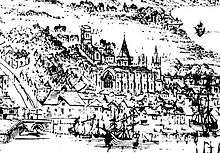Eastminster
Eastminster (The Abbey of St. Mary de Graces) was a Cistercian abbey on Tower Hill in London, founded by Edward III in 1350 immediately outside the Roman London Wall and thus today in the E1 postcode district.[1] Among its endowments was the reversion in 1350 given by King Edward which he owned of one of the four manors of Shere in the hamlet of Gomshall, Surrey which acquired the name Towerhill, due to its patronage of the abbey.[2]

New Abbey was an alternative name for the site.[3]
In 1375, Sir Nicholas de Loveyne bequeathed to the Abbot and Convent the reversion of the mills of Crash Mills to endow the perpetual singing of masses for the donor.[4] Crash Mills were situated on the River Thames, near East Smithfield.[5]
The abbey was dissolved in 1538, and the site has for centuries been occupied by the London part of the Royal Mint.[6]
A large-scale excavation of the site of the abbey took place in 1983–88. An analysis of the archaeological and documentary evidence uncovered has been published by the Museum of London.[7]
Burials at the Abbey
References
- Eastminster - British History Online
- H. E. Malden (editor) (1911). "Parishes: Shere". A History of the County of Surrey: Volume 3. Institute of Historical Research. Retrieved 9 June 2017.CS1 maint: extra text: authors list (link)
- The London Encyclopaedia, Weinreb and Hibbert, 1984
- Leland L. Duncan. "Medieval & Tudor Wills at Lambeth". Kent Archaeological Society. Retrieved 9 June 2017.
- 'Stepney: Economic History', A History of the County of Middlesex: Volume 11: Stepney, Bethnal Green (1998), pp. 52-63. URL: http://www.british-history.ac.uk/report.aspx?compid=22735 Date accessed: 9 June 2017.
- Harvey, John (1978). The Perpendicular Style. Batsford.
- The Cistercian abbey of St Mary Graces, East Smithfield, London. London: Museum of London. 2011.